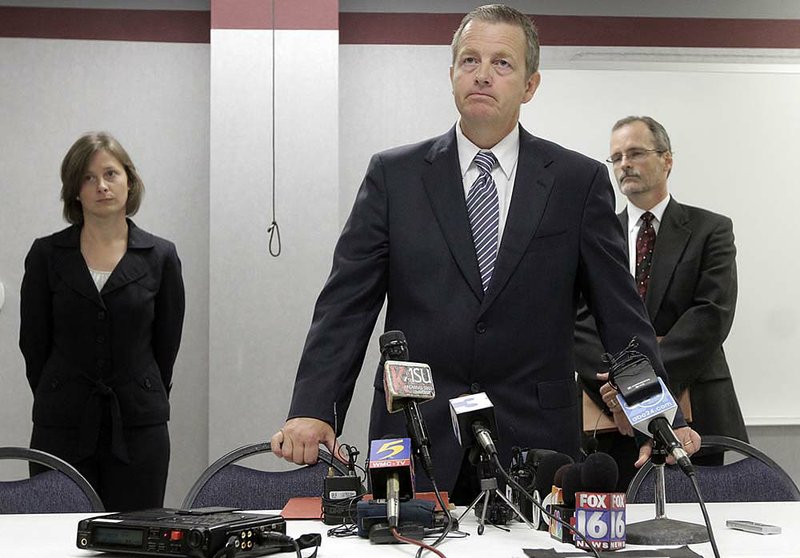LITTLE ROCK — Stale evidence. New DNA testing. Allegations of jury misconduct.
These three factors played a key role in state prosecutors’ decision to broker a deal with defense attorneys who represent Damien Echols, Jason Baldwin and Jessie Misskelley, who were convicted in 1994 of killing three 8-year-old Cub Scouts.
SPECIAL SECTION
Friday’s plea deal - which allowed Echols, Baldwin and Misskelley to enter guilty pleas to lesser charges while still maintaining their innocence - was proposed by defense attorneys.
But prosecutors readily agreed that a deal was in everyone’s interest.
“If I could have hammered these guys, I’d certainly try them,” Prosecuting Attorney Scott Ellington said. “But I made the tough decision and realized it’d be difficult to win a new trial with 18-year-old evidence.
It also was a tough call for defense attorneys, who expected that Circuit Judge David Laser would grant new trials at a December hearing.
Their optimism about a new trial stemmed from the results of cutting-edge DNA testing, which failed to put any of the men at the crime scene, according to court documents.
Prosecutors understood that optimism.
Document set
West Memphis Murders
“I made the rounds and talked to the former prosecutors [Brent Davis and John Fogleman],” Ellington said. “Everybody was saying it looked like Laser would give us a new trial.”
The defense had long pondered whether it should pitch a deal that would set their clients free immediately, said Stephen Braga, a Washington, D.C., defense attorney for Echols.
The possibility of such a deal first took shape Aug. 3 in Little Rock, when Patrick Benca, another defense attorney representing Echols, had lunch with an old friend from law school: Arkansas Attorney General Dustin McDaniel.
Benca asked McDaniel if he thought the state might be amenable to a plea agreement, Braga said, and McDaniel suggested defense attorneys meet with the prosecution. McDaniel then arranged a meeting.
At first, prosecutors wanted a guilty plea in exchange for the three men’s release.
No deal, Braga told them.
The two sides discussed a no-contest plea in which a defendant neither admits nor disputes a charge.
Braga then proposed an Alford plea, which allows a defendant to plead guilty while still proclaiming his innocence to the court. It stems from a 1970 U.S. Supreme Court case in which justices ruled that no constitutional barriers prevent a judge from accepting a guilty plea from a defendant who still wants to proclaim his innocence.
Ellington and deputy prosecutors met with McDaniel on Aug. 9.
Echols agreed to the plea agreement that day. Misskelley followed a day later.
“Baldwin held out and held out,” Ellington said. “It looked like he wouldn’t get into the boat.”
On Wednesday, two days before the hearing, Baldwin agreed.
Baldwin wanted an acquittal, he said. But his concern for Echols, who remained on death row, prompted him to change his mind.
“If it was just me, as much as I hated being in prison ... I was ready to fight it, trial and court. But he had it so much worse than I,” Baldwin said.
For Echols, the decision wasn’t difficult. “I’m just tired,” he said. “It’s just been a living hell.”
Defense attorneys interpreted prosecutors’ willingness to cut a deal as an “implicit recognition” on the state’s part that a new trial was not only likely, but not winnable, said Dennis Riordan, one of Echols’ defense attorneys.
While the Alford plea allowed for the three men’s release, it isn’t a free pass.
Echols, Baldwin and Misskelley will be considered felons, which means they cannot vote or own firearms.
And while they were sentenced to the time they’d already served in prison - 18 years and 78 days - they were given additional 10-year suspended sentences. If they meet the conditions of their suspended sentences, the men will remain free.
Ellington said if he hadn’t agreed to the deal, the three men could have received a new trial as early as next spring. Had Laser decided not to grant a new trial, appeals could have taken years, he added.
“That gives both parties incentive to get this thing done,” Ellington said.
The plea also eliminates the possibility of lawsuits, he added.
Ellington said he called state Sen. David Burnett - who presided over the original trials - to notify him of the plea.
The former judge said he still thinks the three men killed the boys but is “satisfied that justice was done.”
During his time as judge he ruled in “one or two” cases where an Alford plea was entered.
“It’s unusual because the plea itself is a conflict,” he said. “On one hand you’re saying you’re guilty and on the other hand, I’m not guilty to avoid the consequences that would result from going to trial.”
Ellington said he feels justice was served as well.
“It was an appropriate resolution to the case. The legal tangle that has become known as the West Memphis Three is finished.”
Front Section, Pages 6 on 08/20/2011

